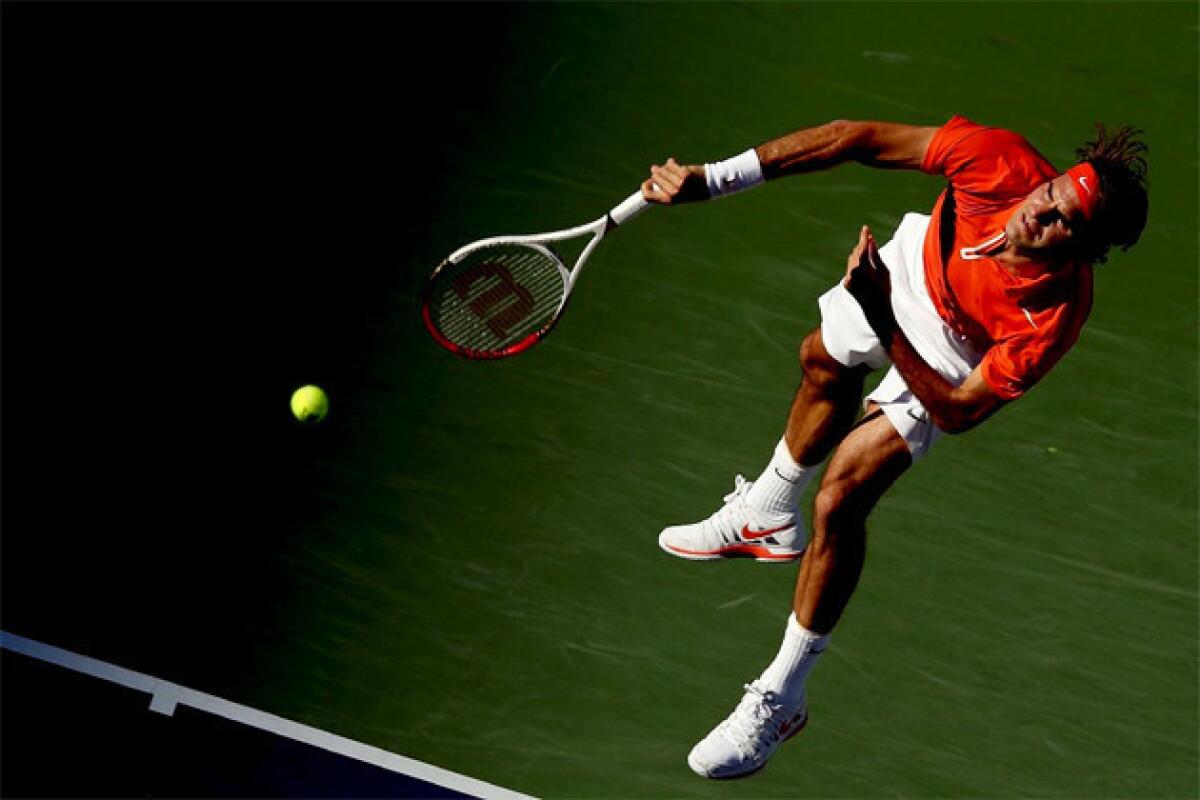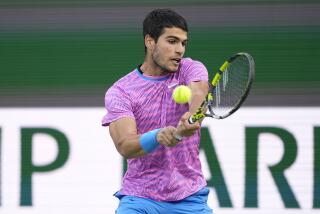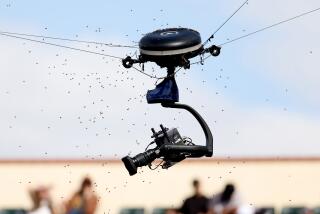Time is essence of discussion at Indian Wells tennis tournament

- Share via
Time.
It’s a topic that doesn’t much affect Roger Federer.
The owner of 17 major titles and the defending champion of the BNP Paribas Open in Indian Wells never wastes time. He certainly didn’t on Monday, taking only 61 minutes to defeat Ivan Dodig of Croatia, 6-3, 6-1, in the third round at Indian Wells Tennis Garden.
Federer doesn’t fiddle with his clothing or walk in dizzying circles after a tense point. Whether he hits a swift winning shot after a short rally or mishits a losing shot after running and running during a long point, Federer just moves ahead.
That’s not always the case with others.
Spaniard Rafael Nadal, seeded fifth here and owner of 11 major titles, is a noted time waster.
He will dig at an imaginary piece of dirt that might or might not be stuck in his sock or his shorts. He will search for shade after a long point or maybe the sun after a short point.
Whatever he does, Nadal does not pay attention to the time rules that until lately have been mostly ignored. At tournaments governed by the International Tennis Federation (including the four Grand Slam events), players are supposed to have only 20 seconds between points; at tournaments governed by the ATP, such as the BNP Paribas Open, they get 25 seconds.
It has been suggested that tennis needs a clock on the court, a tennis version of basketball’s shot clock, to let players know when it’s time to get to the service line.
Top-ranked Novak Djokovic seemed to benefit at a tournament in Dubai last month when his opponent, Juan Martin del Potro, got a warning for taking more than 25 seconds. An angry Del Potro hit a forehand wide, lost the match and afterward blamed the defeat partly on getting the warning.
Even so, Djokovic is not in favor of strict enforcement or a clock. “No,” he said. “I am not.”
Nadal, who advanced to the fourth round here Monday when his opponent, Leonardo Mayer, withdrew because of a back injury, not surprisingly is very much against the new approach to enforcement and is no fan of a clock.
“Sorry,” he said. “I cannot support that. First thing, because the rules go against the great points of tennis. The best points of the season are long rallies and amazing points. With 25 seconds you play a long rally and you think you can play another long rally the next point? No. So, you want to go against the good tennis?
“So the guy who accepted this rule was not very smart, in my opinion. . . .
“You know what I did? Maybe somebody, maybe nobody did at the ATP, but I went back to my matches, great matches, in Grand Slams, playing long rallies in big tournaments, and when you play like a 30-shot rally, 40-shot rally like final of Roland Garros, like final of Australia, like final of any good tournament, you know, how much time we rested?”
Caroline Wozniacki, a former No. 1-ranked woman who is seeded eighth here and defeated 29th-seeded Elena Vesnina in the third round Monday, 6-2, 6-1, said the women are less likely to be time wasters.
Still, she doesn’t favor a clock, for men or women.
“I think it would probably stress the players more than it would do good,” she said.
Djokovic said the idea of a clock could not work because there are so many variables. How long does it take the ball boys or girls to fetch balls in between points? What if one player is slow but the other is fast? “There are situations sometimes where it took quite a bit of time to get me a towel,” he said. “You’re losing a lot of time there.”
On the court Monday, Federer clutched at his back occasionally during his win. No big deal, he said. “It’s not the first time it’s happened in my career,” said Federer, 31. “I know how to deal with it. I have a day off. Everything is all right.”
Ana Ivanovic, seeded 11th, was upset by 24th-seeded Mona Barthel of Germany, 6-1, 3-6, 6-0. Ivanovic won this tournament in 2008.
Top-seeded Victoria Azarenka, the defending women’s champion and winner of this year’s Australian Open, advanced to the fourth round with a 3-6, 6-3, 6-0 win over 28th-seeded Kirsten Flipkens of Belgium. The last American left in the women’s draw, Jamie Hampton, was eliminated by Urszula Radwanska, 6-0, 7-6 (4).
twitter.com/mepucin
More to Read
Go beyond the scoreboard
Get the latest on L.A.'s teams in the daily Sports Report newsletter.
You may occasionally receive promotional content from the Los Angeles Times.










